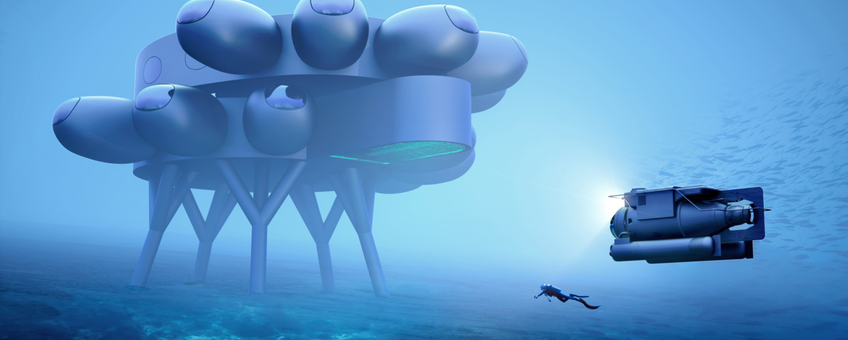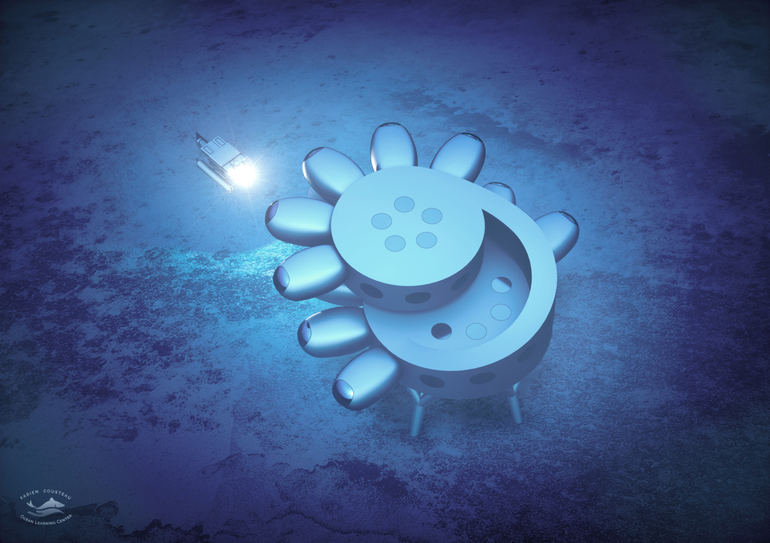
Curacao’s New Underwater Research Station
Dutch Caribbean Nature Alliance (DCNA)The station is slated to be built within three years and will provide unparalleled access to the deep sea.
For millennia, people have looked to space in wonderment, dreaming of far away planets with unimaginable life. Little did they know, there were areas on our very own planet, unrecognizable and booming with its own unique life forms. Although nearly 99% of livable space on the planet is located under the surface of the ocean, we’ve only just begun exploring these areas within the past fifty years. Even with the most advanced ocean satellites, buoys, deep sea submarines and sonar we’ve only explored about 5% of the ocean floor and mapped less than a fifth to a resolution of five kilometre (meaning we can only 'see' features larger than five kilometre). That is to say, we have better maps of the moon and Mars than we do of our own sea floor.
Many scientists believe the deep sea holds the keys to solutions ranging from battling climate change to medical breakthroughs, however harsh conditions prohibit access to researchers. Between the crushing depths and total darkness, living and working in these conditions has previously been impossible.

Underwater Research Station
That is all about to change with the new underwater research station ‘PROTEUS™’. PROTEUS™ is project of the Fabien Cousteau Ocean Learning Center (FCOLC) and is Fabien Cousteau's vision, supported by Yves Béhar through design, and partners from Northeastern University, Rutgers University and the Caribbean Research and Management of Biodiversity Foundation (CARMABI). PROTEUS™ will be a three hundred square metres underwater research station and habitat. This modular lab will be built off the coast of Curaçao and will provide unprecedented access to scientists hoping to unlock deep sea secrets for creative solutions to a wide range of problems.
The research station itself is a two-story circular building, which will sit on stilts on the ocean floor. Inspired by the shapes of coral polyps, the design includes individual pods which will house laboratories, medical facilities and sleeping apartments. The design also includes a moon pool which will give divers direct access to the ocean floor.
Creative solutions
Its pretty incredible to think, since the start of space travel, twelve people have been to the moon whereas, humans have been exploring the oceans for thousands of years and only three people have ever descended to the deepest part, the Marianas Trench. Deep ocean travel has its own challenges, from crushing pressure to complete and total darkness. After a depth of two hundred metres sunlight is no longer able to penetrate the water, making imaging and exploration exceedingly difficult.
Powered through wind, solar and ocean thermal energy, this cutting-edge research station will showcase the power of green technology. In addition, its deep ocean design could allow for new opportunities for research stations in areas of extreme weather, keeping it safe from tsunamis and hurricanes. By allowing researchers to continuously live at depth, researchers will now be able to work throughout the day without needing to plan decompression stops.
The future of science
PROTEUS™ will serve as the International Space Station equivalent for underwater scientists, bringing together government agencies, scientists and the private sector to promote collaboration and scientific research. "Ocean exploration is a thousand times more important than space exploration for -- selfishly -- our survival, for our trajectory into the future," stated Cousteau. "It's our life support system. It is the very reason why we exist in the first place."
The original plan was to build PROTEUS™ within three years, however, due to coronavirus, the project has already experienced delays. The goal is to offer regular live streams and video content, giving the entire world access to the amazing research being conducted. “Imagine if you found something amazing -- whether it be microcosmic like a pharmaceutical, or macrocosmic like the next greatest animal -- if you could show it to classrooms and universities," Cousteau imagined. "Our mission is to be able to translate complex science into something that the average person not only maybe will understand, but fall in love with."
More information
Text: Dutch Caribbean Nature Alliance
Photos: Yves Béhar, Fuseproject, PROTEUS™ (lead photo: Fabien Cousteau's PROTEUS™)
